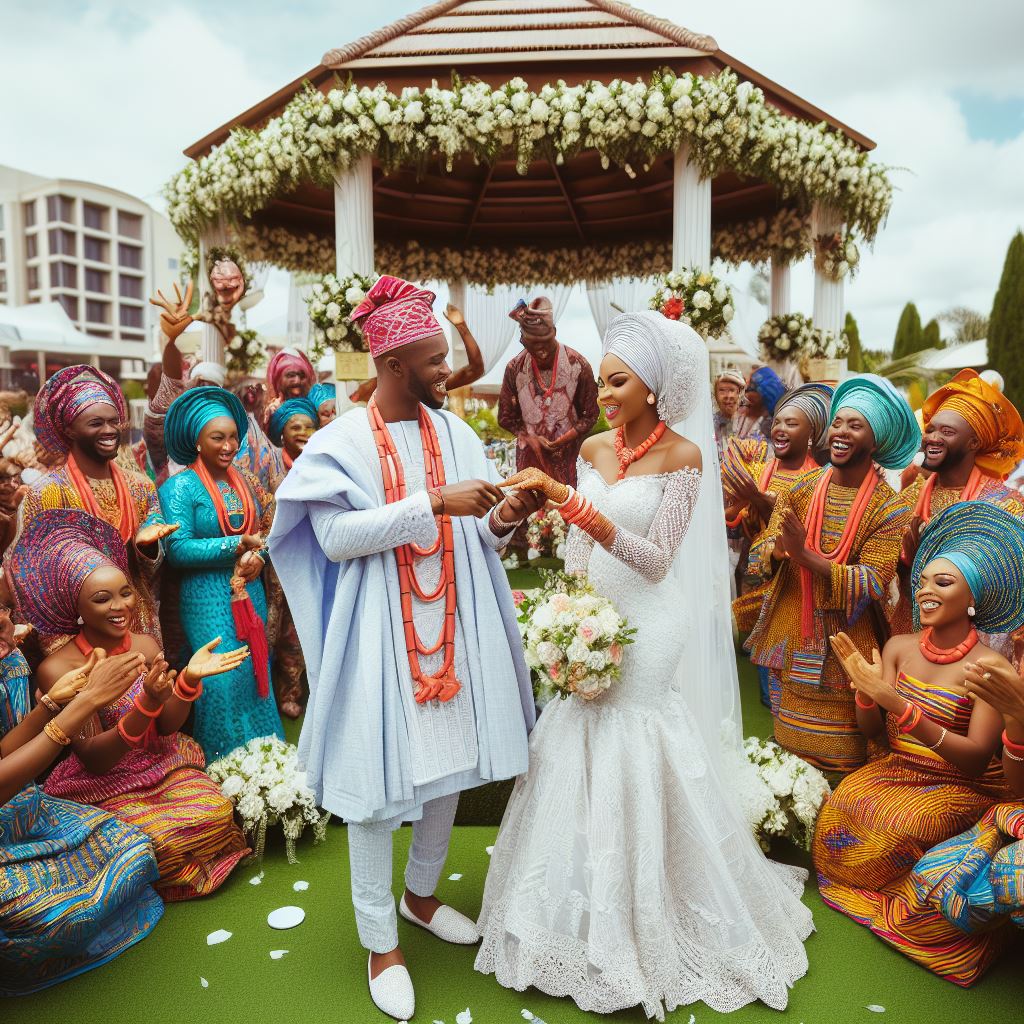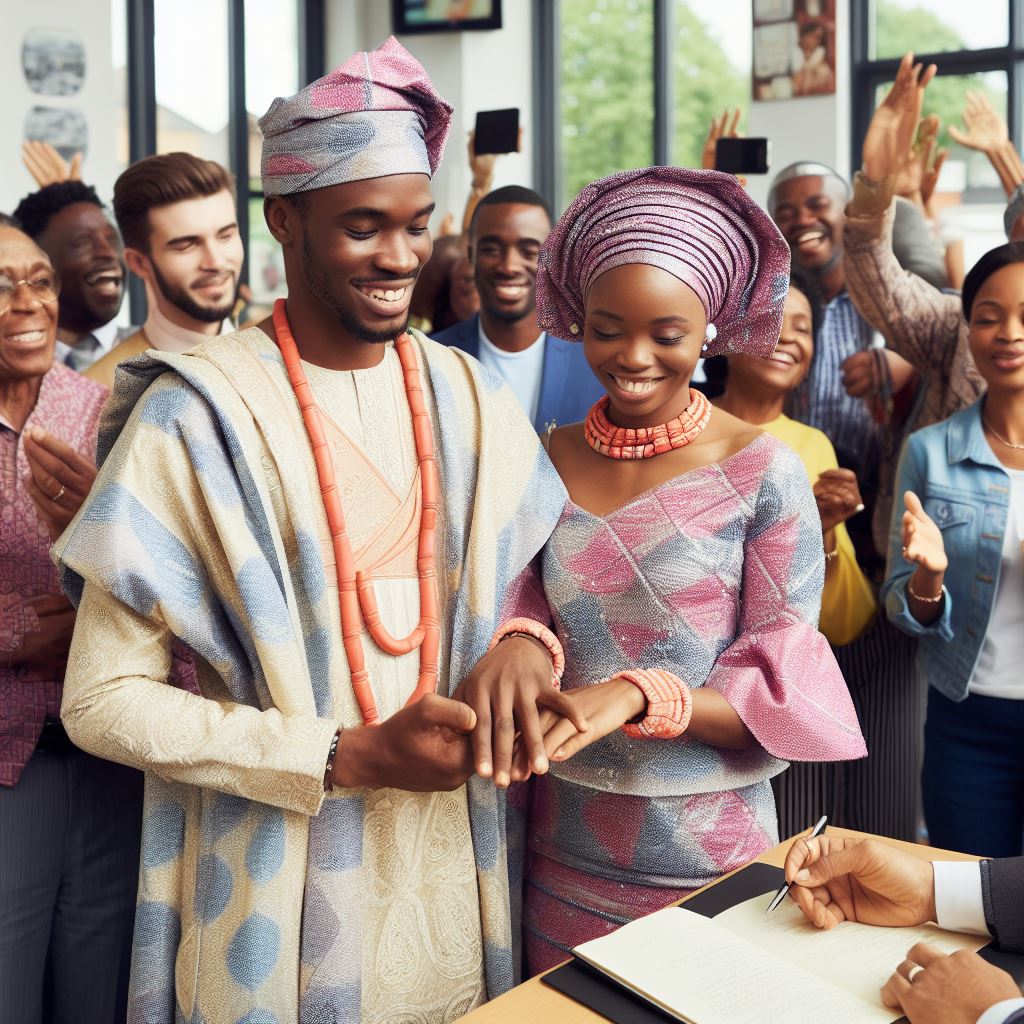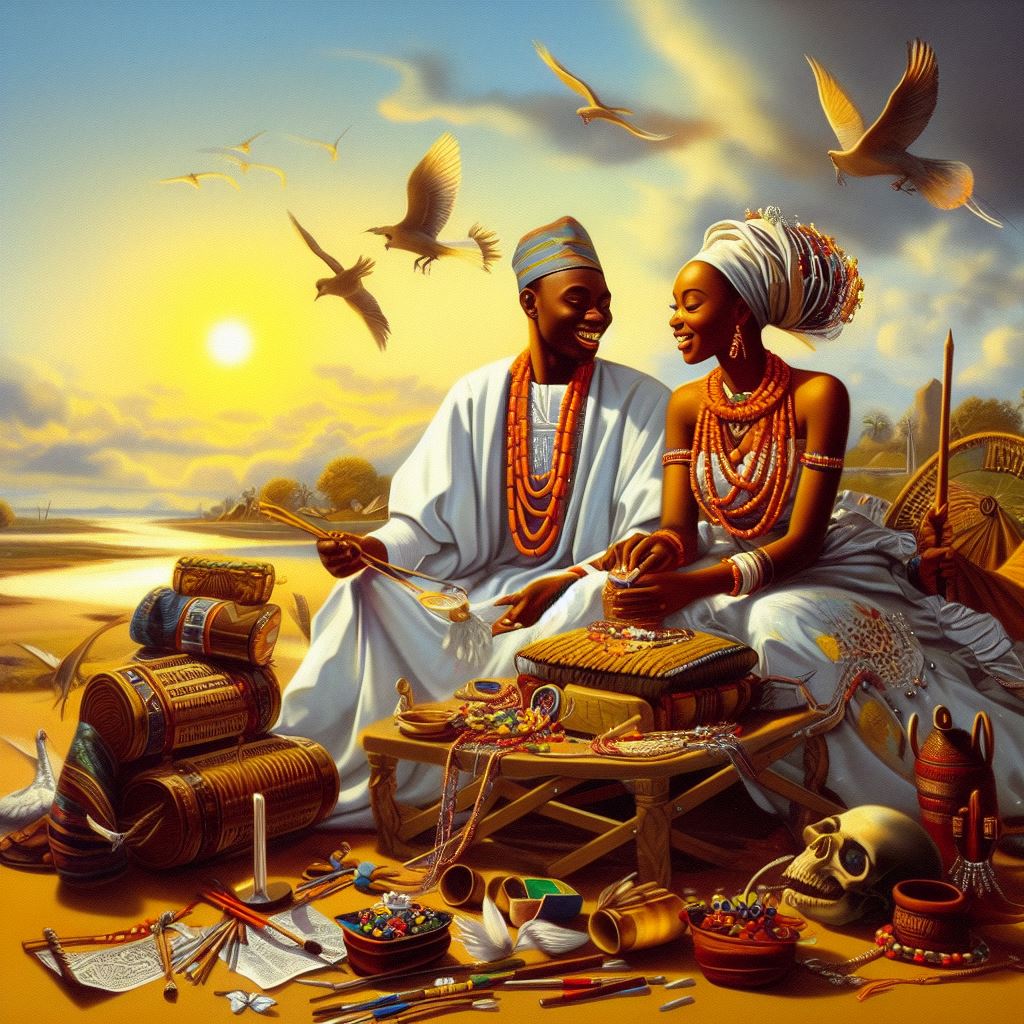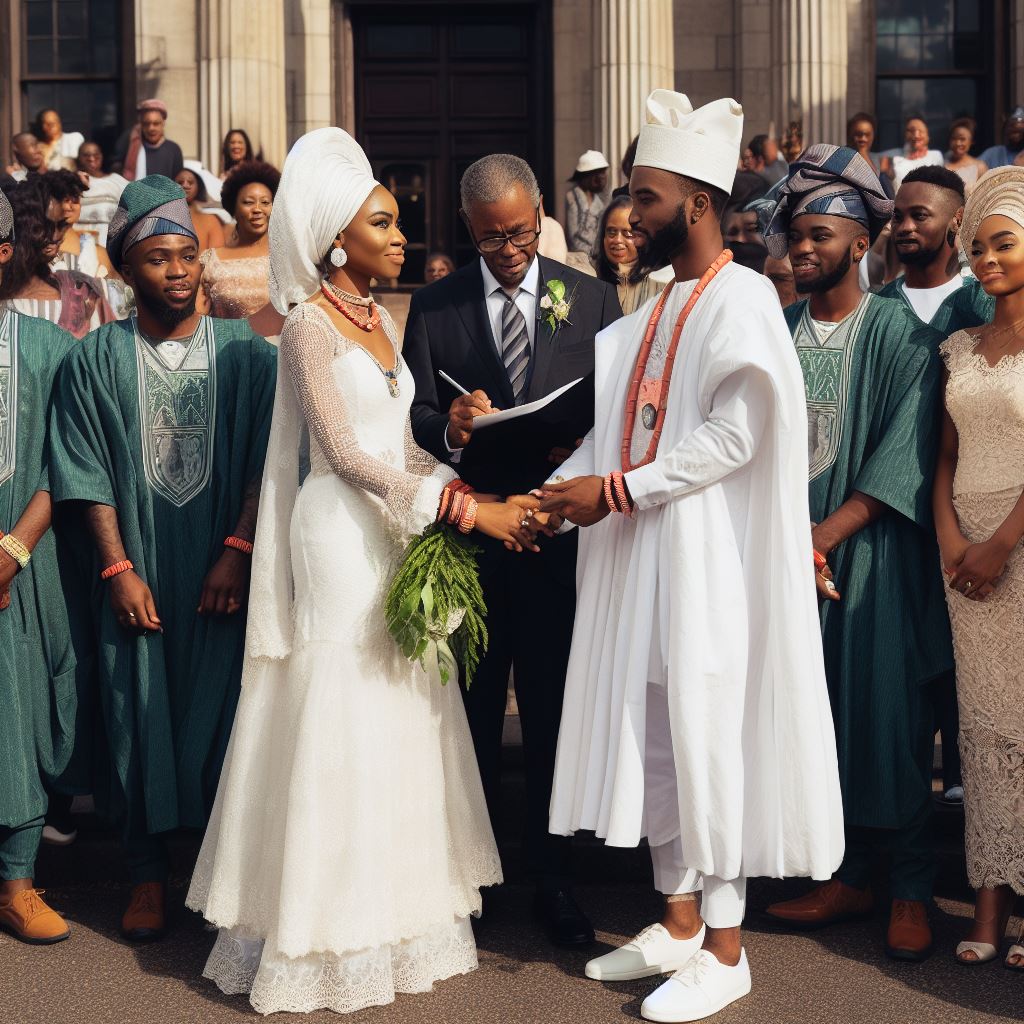Introduction
Marriage is a cornerstone of Nigerian culture, with diverse tribes exhibiting unique marriage rituals.
In this exploration, we delve into the significance of these rituals in Nigerian tribes and uncover their rich traditions.
- Nigerian tribes celebrate their unique marriage customs, reflecting their cultural diversity.
- Marriage is not just a union of two individuals but a fusion of families, communities, and traditions.
- The customs and rituals surrounding Nigerian marriages are deeply rooted in history and culture.
- These rituals are far from mere formality; they hold profound significance in each tribe.
- Our journey through the vibrant tapestry of Nigerian marriage rituals begins with an overview of their importance.
Thesis Statement: We will explore the diverse marriage rituals in various Nigerian tribes, understanding their cultural importance.
Read: Special Anniversary Greetings for Friends: Naija Edition!
Yoruba Tribe
In this blog section, we will explore the marriage rituals of the Yoruba tribe in Nigeria.
Yoruba Tribe: Description and Significance
The Yoruba tribe is one of the largest ethnic groups in Nigeria, primarily located in the southwestern part of the country.
They have a rich cultural heritage and are known for their colorful festivals and ceremonies.
Yoruba Marriage Rituals
Yoruba marriage rituals are steeped in tradition and hold great significance for the community.
Let’s take a closer look at these rituals:
Introduction and Acceptance by Both Families
Before a Yoruba wedding takes place, the families of the bride and groom must formally introduce themselves and accept the union.
This process involves exchanging gifts and negotiating the terms of the marriage.
Traditional Engagement Ceremonies
The Yoruba engagement ceremony, also known as “Owanbe,” is a festive occasion where family and friends gather to celebrate the upcoming marriage.
It involves music, dance, and the exchange of gifts.
The Nikkai (Islamic) or Church Wedding Ceremonies
Depending on the religious beliefs of the couple, the Yoruba wedding ceremony can either be conducted in a mosque (Nikkai) for Muslims or a church for Christians.
These ceremonies involve prayers, blessings, and the exchange of vows.
Traditional Wedding Attire and Accessories
The Yoruba bride and groom wear traditional outfits rich in cultural symbolism.
The bride often adorns herself with elaborate gele (headgear), colorful aso-oke (fabric), and intricate jewelry, while the groom wears a flowing agbada (robe) and a fila (cap).
Importance of Dowry
In Yoruba tradition, the groom’s family is expected to present a dowry, known as “ijoko,” to the bride’s family.
This symbolizes the groom’s ability to care for his wife and is a sign of respect for the bride’s family.
Examples of Yoruba Marriage Rituals in Movies and Real-Life Stories
Popular Yoruba movies have widely depicted Yoruba marriage rituals, highlighting the cultural heritage of the tribe.
Real-life stories also highlight the beauty and significance of these rituals in Yoruba society.
Basically, the Yoruba tribe in Nigeria has a unique set of marriage rituals that are deeply rooted in their cultural heritage.
From the formal introduction of families to the intricate wedding attire, these rituals are a celebration of love, family, and community.
Read: The Essence of Marriage: Quotes from Nigerian Elders
Igbo Tribe
The Igbo tribe is one of the ethnic groups in Nigeria with rich cultural practices.
Their marriage rituals showcase their unique customs and beliefs.
Description of Igbo Marriage Rituals
Introduction and acceptance by both families
Before a couple can proceed with marriage, the families of both the bride and groom must formally meet and give their consent.
Traditional Igba Nkwu (Wine Carrying) ceremony
This ceremony is a significant part of Igbo marriage rituals.
It involves the groom and his family bringing palm wine to the bride’s family.
Igbo traditional wedding attire and customs
The bride dresses in a traditional attire called “Igba Nkwu” which is usually a wrapper and blouse made from vibrant fabrics like George or Ankara.
Role of the bride price
The groom’s family presents a bride price to the bride’s family as a symbol of appreciation for raising their daughter.
Special Igbo marriage customs and beliefs
The Igbo tribe believes in the importance of ancestral blessings and often includes traditional rituals to honor their ancestors during the wedding ceremony.
Sharing real-life examples of Igbo marriage rituals
1. Ada and Chinedu’s Wedding
Ada and Chinedu had a traditional Igbo wedding ceremony that adhered to all the customs mentioned above.
The families came together, and the Igba Nkwu ceremony was filled with joy and celebration.
2. Nneka and Ugochukwu’s Wedding
Nneka and Ugochukwu incorporated unique Igbo marriage customs by performing the “Iri Ji” ritual during their wedding.
This ritual signifies the acceptance of the bride into her husband’s family.
3. Obinna and Chidinma’s Wedding
During their wedding, Obinna and Chidinma included an ancestral homage ritual where they poured libations to honor their ancestors and seek their blessings for a prosperous marriage.
Therefore, Igbo marriage rituals are significant in showcasing the tribe’s cultural practices and beliefs.
These customs create a sense of unity between the families and honor their ancestors.
By embracing their traditions, couples ensure a meaningful and memorable wedding experience.
Read: Combining Tradition & Love: Anniversary Wishes in Pidgin
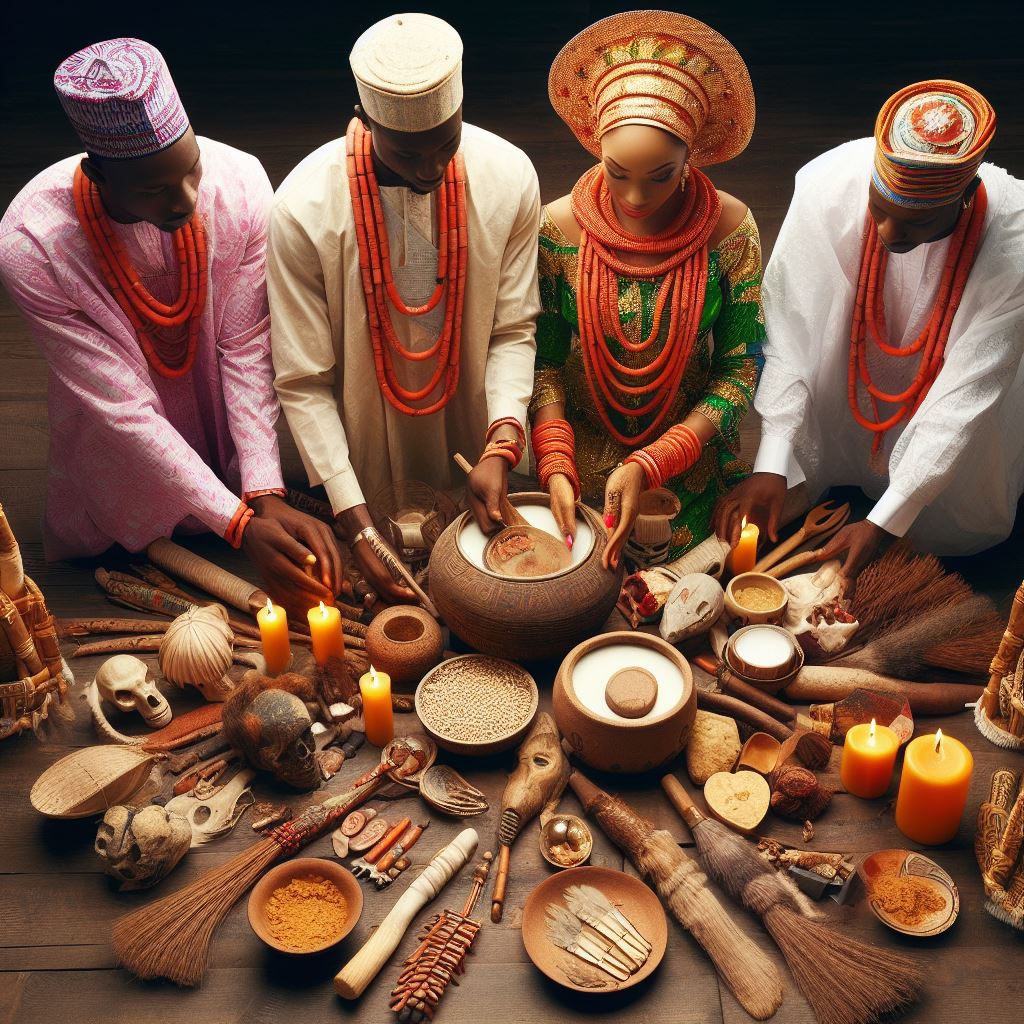
Hausa Tribe
The Hausa tribe is one of the largest ethnic groups in Nigeria, primarily found in the northern region.
Their rich cultural heritage is well-known, and they significantly influence various aspects of Nigerian society.
Introduction to the Hausa Tribe
The Hausa tribe is prevalent in Nigeria and is considered one of the major ethnic groups in the country.
Known for their diverse cultural practices, they possess a population of over 30 million, which includes unique marriage rituals.
Unique Hausa Marriage Rituals
The Hausa tribe has distinct customs and rituals surrounding marriage, which play a vital role in the union of couples within their community.
Courtship and Proposal Process
Hausa marriages often start with an intricate courtship process, where the suitor expresses his interest in the woman to her family.
The suitor’s family presents a formal marriage proposal, including details about the groom’s background and intentions.
Traditional Pre-Wedding Ceremonies like Kamu
Kamu, a pre-wedding ceremony, is widely celebrated in the Hausa community.
It involves the presentation of gifts by the groom’s family to the bride’s family, symbolizing their commitment and willingness to integrate into each other’s lives.
The Nikkai (Islamic) Wedding and Traditional Hausa Wedding
The Nikkai wedding, an Islamic ceremony, is the most important part of a Hausa wedding.
It includes the recitation of prayers, exchange of vows, and signing of the marriage contract.
A traditional Hausa wedding may follow, incorporating cultural elements such as music, dance, and traditional rituals.
Hausa Traditional Wedding Attire and Customs
During the Hausa traditional wedding, the bride and groom and their immediate families wear elaborate traditional attire.
The bride adorns a stunning henna design on her hands and feet, symbolizing good luck and fertility.
Importance of Dowry and Marriage Gifts in Hausa Culture
In Hausa culture, the payment of dowry plays a significant role in the marriage process.
The groom’s family presents gifts, including money, clothing, and jewelry, to the bride’s family.
This symbolizes appreciation, respect, and the groom’s ability to provide for his wife.
Specific Examples of Hausa Marriage Rituals
In one unique Hausa marriage ritual, they conduct the “Wuni Sheme” ceremony, where they offer the bride a special traditional mixture to drink before she departs from her family’s home.
It is believed to bring blessings and protect her from evil spirits.
Another traditional Hausa marriage ritual is the “Fatha Kareni” ceremony, where the groom’s family performs a symbolic act of sweeping the bride’s house to cleanse and prepare it for her arrival.
Furthermore, the “Kaya” ceremony signifies the official handover of the bride to the groom’s family.
It involves the exchange of gifts, prayers, and well wishes for the newlyweds.
Generally, the Hausa tribe in Nigeria has its unique marriage rituals that highlight their rich cultural heritage.
From courtship to wedding ceremonies and customs, each step holds significance and contributes to the celebration of love and union within the Hausa community.
Read: Love in Literature: Nigerian Writers on Matrimony
Delve into the Subject: Marriage Books That Address Nigerian Cultural Nuances
Conclusion
Exploring marriage rituals in Nigerian tribes is significant as it provides insight into the cultural and traditional aspects of these tribes.
The Yoruba, Igbo, and Hausa tribes each have their unique marriage rituals that reflect their values and beliefs.
Elaborate Yoruba marriage rituals involve the families of the bride and groom, symbolizing the unity of both families.
They include ceremonies such as the introduction ceremony, engagement, and the main wedding ceremony.
In contrast, Igbo marriage rituals focus on uniting two families and mirror the Igbo belief in the significance of ancestral spirits.
These ceremonies include the families of the bride and groom visiting each other, performing traditional rites, and paying the bride’s dowry.
Hausa marriage rituals adhere to simplicity and Islamic traditions, marking a contrast with other ceremonies.
These rituals include the consent of the bride and groom, the payment of the bride’s dowry, and the signing of the marriage contract.
Overall, exploring these marriage rituals reveals the diversity and richness of Nigerian culture.
It highlights the values, traditions, and beliefs of each tribe, and the importance they place on family and community.
By understanding these rituals, we gain a deeper appreciation for the uniqueness of different Nigerian tribes and their traditions.

